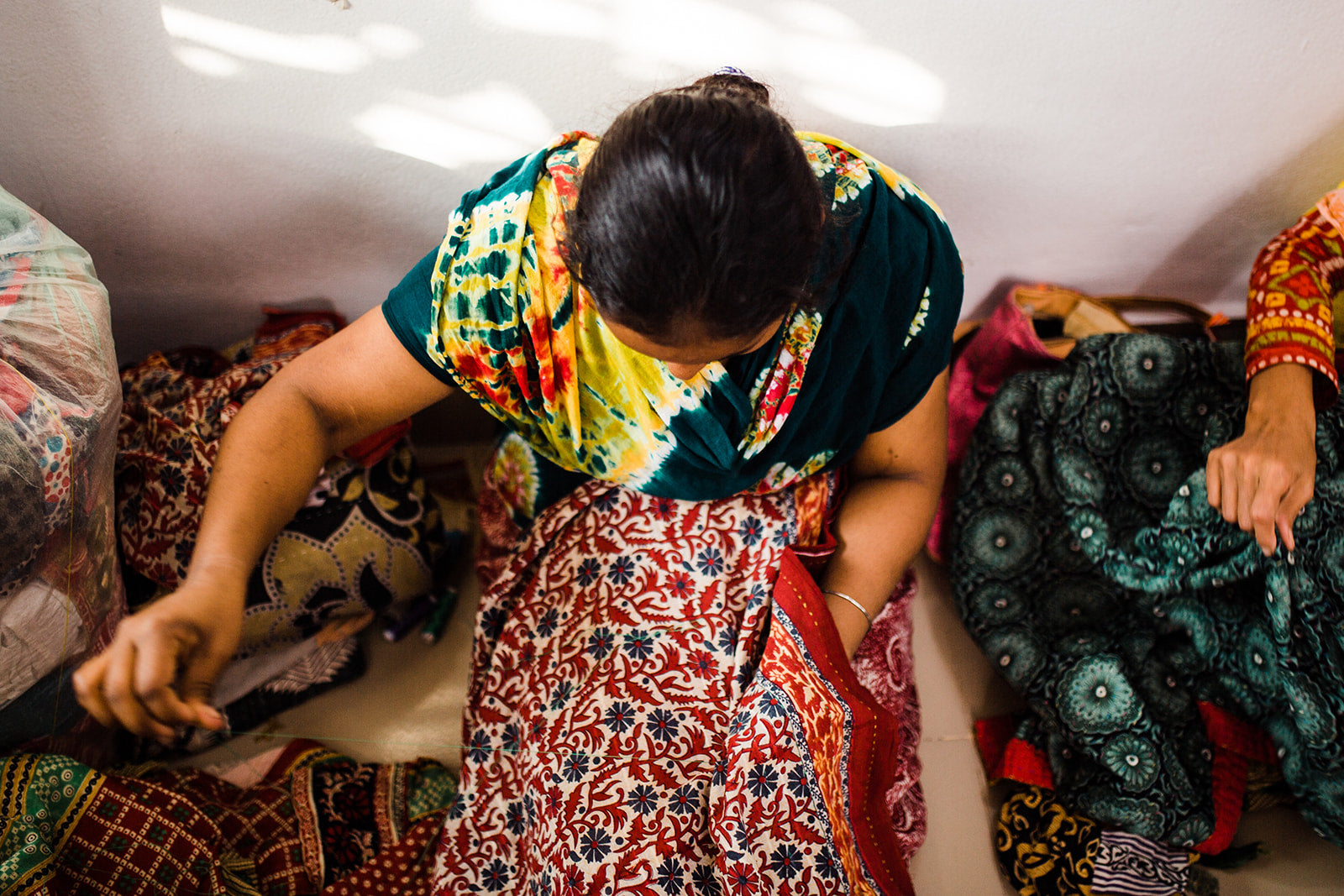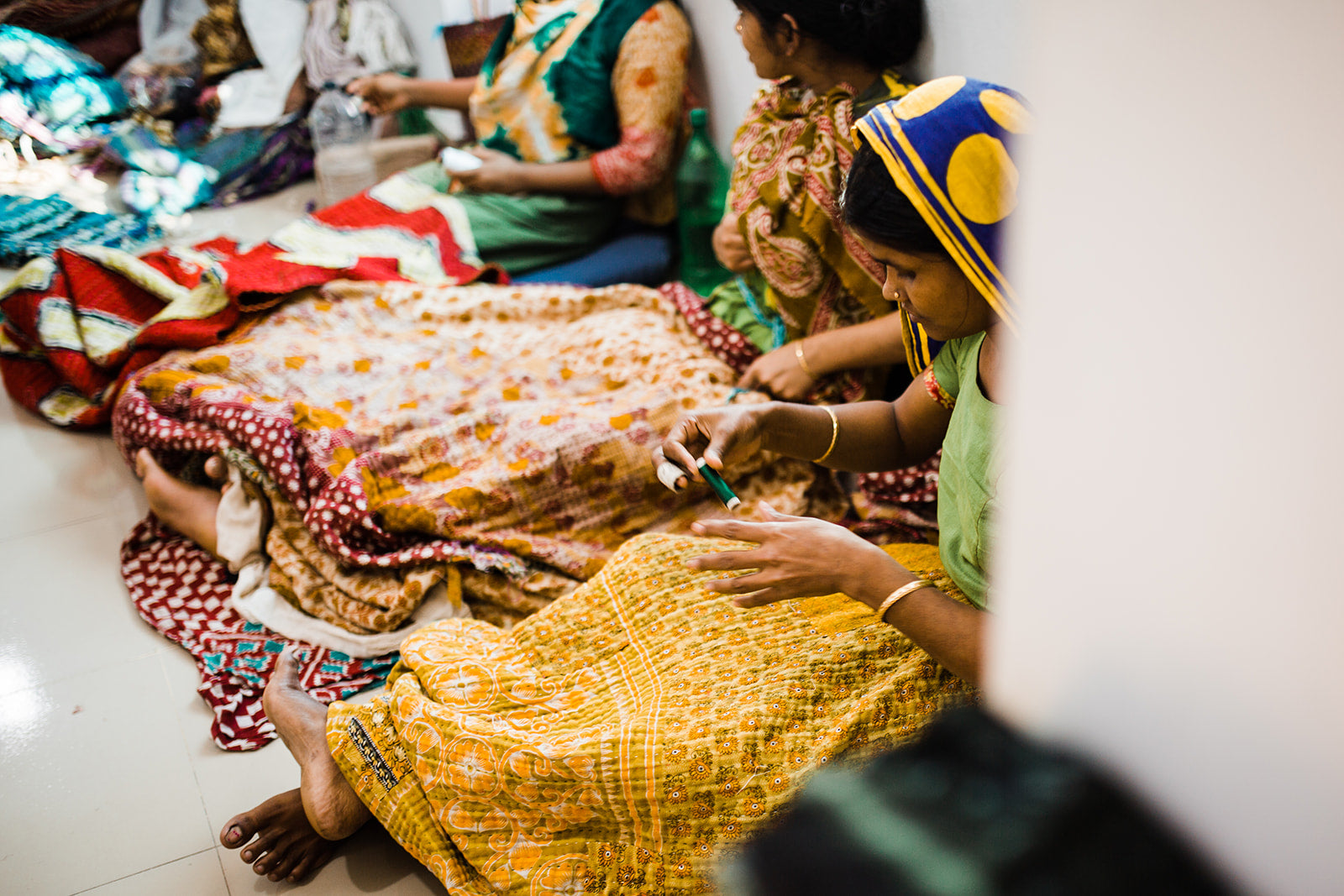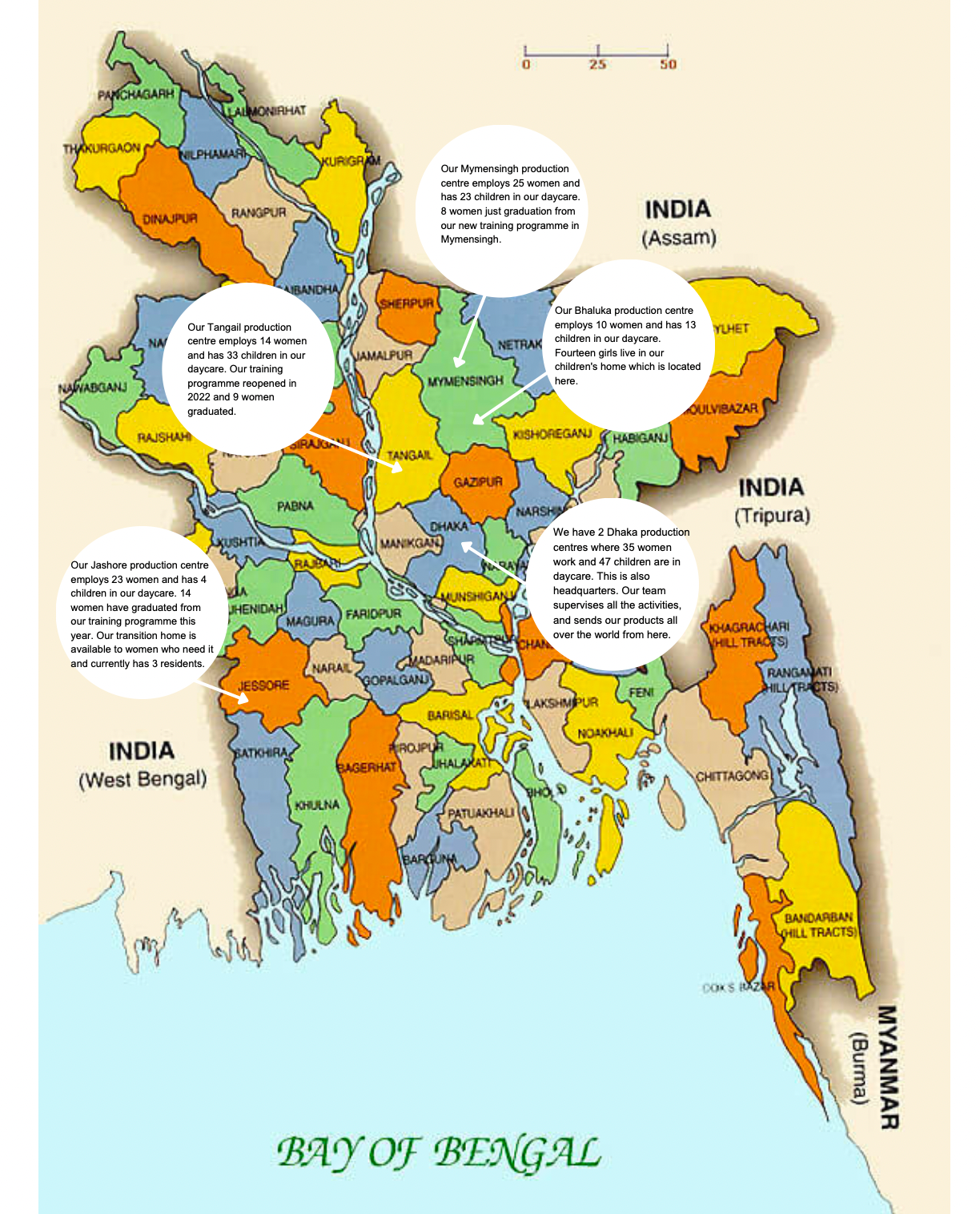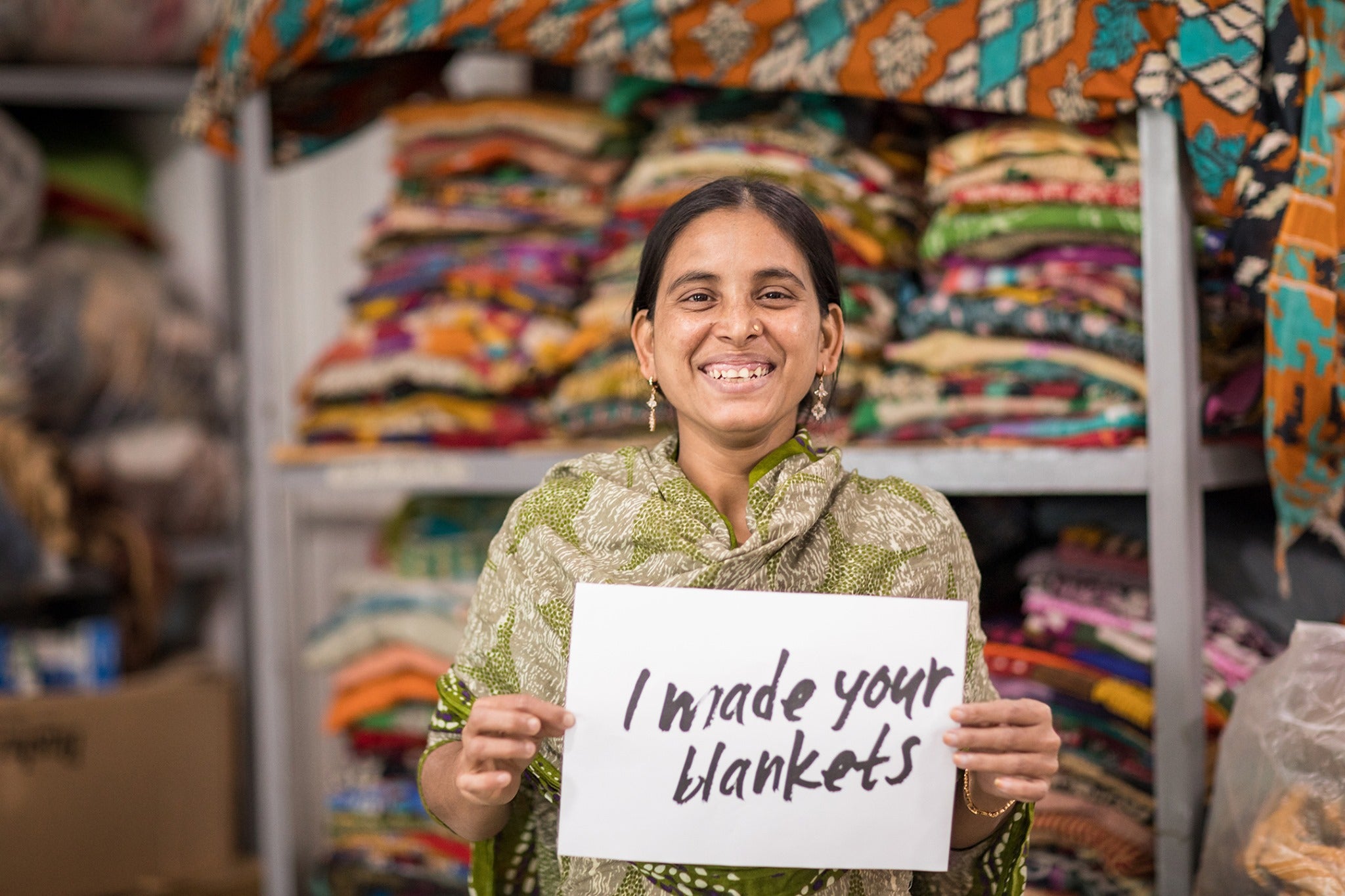Who Makes dignify's Kantha Blankets?
The women who make our blankets are survivors of exploitation, now employed in a skilled, sustainable job in a wholehearted environment of respect, love, & dignity.
What does "survivors of exploitation" mean?
There are many risks for girls and young women in Bangladesh, and every woman has a different story. Here are some stories & journeys that may lead to becoming a Basha artisan:
- A mother who is homeless
- A woman working in formal or floating prostitution who wants out
- An underpaid factory worker
- A woman who has been trafficked domestically or internationally & has been repatriated
- A daughter of a brothel worker
- A woman who has been propositioned by a trafficker (“Do you want a great opportunity for a job?”)
The journey for a Basha kantha artisan
It isn’t easy to access employment when you’ve lost hope in having any kind of future. But Friends of Basha, Basha’s non profit affiliate, is able to help women on this journey. Friends of Basha provides six months of rehabilitation and training, preparing them for future employment & reintegration into society.
When women have completed one of these programs, they are eligible for full-time employment. Basha Boutique is a business that hires successful trainees to continue the work of healing & care in their sustainable, healthy, job environment.
Any artisan for Basha who comes to work and makes an effort will receive a salary that is commensurate with a factory job, but with far superior working conditions. Additionally, women who are motivated have the opportunity to earn more through piece rates, rewarding them for production (within set working hours).
Basha has a specific set of criteria by which they determine eligibility for full-time employment (the risks listed above). At busy times, Basha may contract additional skilled labor from women who are “only” poor, but may not fit the criteria for employment (& the benefits & services associated).
The reality is, some businesses that say their goods are "made by survivors" only employ a portion of artisans — as low as 10% — who fit this criteria. When it comes to being fully survivor or at high risk, Basha's rate is very high. It is costly and sacrificial to hire "undesirable" employees who are plagued with trauma, ongoing difficulties, or are limited in their abilities to produce. Basha is the real deal, providing dignified employment for the women who really need it the most.
In Bangla, ‘basha’ means house. ‘Asha’ means hope. Through dignified work, Basha is building a house of hope in Bangladesh. Women gain job skills, but so much more: they are accepted, valued, and empowered with confidence to contribute to their family, community, & nation.
We are deeply thankful for the work that Basha facilitates (and that you enable, with your purchases!). New life, dignity, and a high view of their contribution as women: a countercultural, beautiful vision.
Basha Boutique's Origin Story
As told by Basha's founder & operations director, Robin Seyfert:
On a July night in 2010, two teenaged girls chatted with one another while they prepared their beds on a train platform. One didn’t have a mother. The other didn’t have a father. “They’ll be in prostitution soon,” I was told by my savvy guide, Razia, who understood their vulnerability. Across from them a new mother held her four day old son... starting his young life with no bed, no home. An older woman eyed me shrewdly, saying she’d slash my throat. “Losing your senses: this is what happens to everyone growing old in the sex profession,” Razia said. I saw the mother of a teen I knew, proud of her comparatively solid, tent-like structure next to the railroad tracks — paid for by selling her body. Her daughter had started following in her footsteps by age 13.
Then, out of the corner of my eye, I caught a glimpse of movement, energy, color: three women attending a support program for women leaving sex work were heading towards me. "Sister, sister," they called, as they waved their storybooks. "We're going home to practice our reading!"
I knew then that my four year term with an NGO was not the end of my time in Bangladesh. Seeing the joy and hope on their faces in the midst of so many others resigned to squalor and degradation…
Less than a year later (2011), a small number of women completed their time with Basha's first partner organization, Children's Uplift Programme, and prepared to begin paid work with Basha, stitching our blankets from recycled saris in a traditional kantha stitch.
CUP was well established and had been providing a drop-in centre, medical care, counselling, and life-skills training for mothers living on the streets in Dhaka. But, many women had struggled to find an ongoing livelihood because of the stigma attached to sex work, as well as the trauma that they continued to deal with. Upon completion of (up to three years with) CUP, Basha would now offer them true, independent employment and the opportunity to leave behind their past lives for good.
The early days were challenging. Basha was a radically different environment from the one our new employees had known before. Quality standards were a totally new concept and caused frequent quarrelling. But, gradually, our trainee artisans discovered that with diligent work they could earn a good wage.
As time passed, the sharp pain on their faces was gradually replaced with peace and hope.
Basha Today
Basha has grown over 11 years from that train platform to having five production centres throughout Bangladesh: the home office in Dhaka, as well as sites Mymensingh, Bhaluka, Jessore, & Tangail. Through their work, they sustain:
- ~150 Basha artisans as well as admin & support staff
- ~120 children in daycare, provided free to moms as a job benefit (paid by support from Friends of Basha)
Friends of Basha was developed as a not-for-profit arm to supplement some the needs that Basha was encountering. Twice-a-day meals and school support for children of Basha employees; a home for young artisans to live with support, or in transition; counselling, mentoring, & psychiatric care, as needed...
Friends of Basha has also created their own training programs (like the ones that prepare women to work for Basha) where they have identified a need.
When you buy a Basha blanket, it pays for:
- A fair wage to the woman who made it, based on local standards and cost of living (fairwageguide.org)
- On-site day care space, where children have a safe and stimulating environment.
- Benefits, like an annual bonus & paid leave for holidays.
- A safe, sensitive work environment.
- Ongoing education for 4-6 hours per week, so they can continue to develop professionally and personally.
- Marketing and product development, allowing Basha to grow & create more jobs for women at risk and survivors of trafficking.
- Access to the global market: The ability for dignify to import, market, & sell the goods in North America, and to be sustainable for the long term.
dignify + Basha
We work exclusively with Basha to supply us with 100% of our inventory. Most of the items in dignify’s shop (all of the standard sizes of kantha) are made by Basha Boutique’s artisans. The products that are not made directly by them — rugs and special kantha — are sourced and vetted by Basha on our behalf.
dignify is the largest reseller of Basha’s products in the world.






